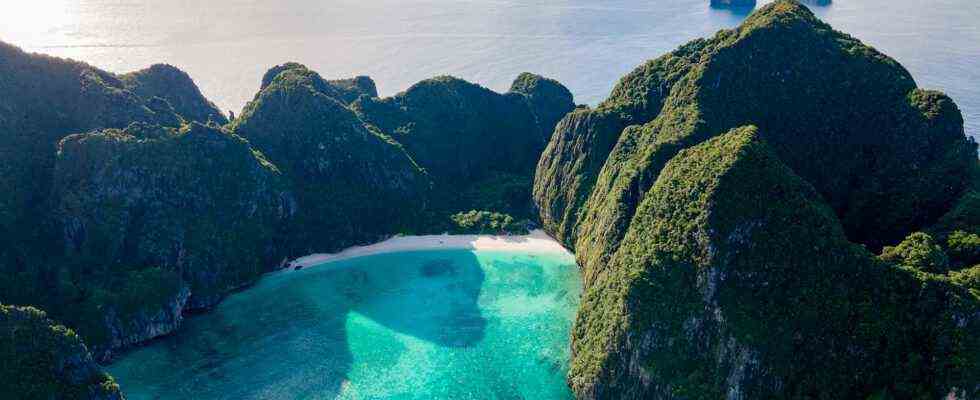Status: December 26, 2021 4:56 p.m.
Because of the pandemic, the tourists from Thailand disappeared. Nature, such as the famous Maya Bay, was able to recover from the rush of visitors. Now the country wants to learn from previous mistakes – with alternatives to mass tourism.
A secluded bay with a dazzling white sandy beach and crystal clear water, embedded in meter-high, overgrown rock formations: the 250-meter-long Maya Bay beach on the Thai island of Phi Phi Le is a place of longing for many travelers.
Maya Bay became famous a good 20 years ago through the Hollywood film “The Beach” with Leonardo DiCaprio. In the film, dropouts attempted a life in paradise far from civilization – but after the film was broadcast, one could no longer speak of paradisiacal conditions in untouched nature in Maya Bay.
Motorboat trips every minute
Up to 6000 tourists suddenly visited the otherwise uninhabited island every day, a total of two million visitors a year entered the little paradise. They were brought to the bay by motor boats every minute and drove away the sharks that lived here. Carelessly dropped anchors damaged the coral reef.
“Within ten years, 70 percent of the coral population disappeared,” says Thon Thamrongnawasawat from Kasetsart University in Bangkok. The marine biologist warned early on of the consequences of uncontrolled mass tourism for the island’s fragile ecosystem. He made sure that Maya Bay was closed to visitors as early as 2018. Even then, his plan was a comprehensive renaturation of the bay. However, it was unclear how long a closure would have been economically justifiable.
Lockdown as an opportunity for nature
At the beginning of the corona pandemic, Thailand closed its borders to tourism nationwide, and Maya Bay was left to fend for another two years. This allowed the ecosystem there to regenerate undisturbed for a total of almost four years. In the meantime, those responsible were able to calmly develop a comprehensive sustainability concept for the bay.
In order to protect the national park in the long term, numerous rules have now been introduced on the island, non-compliance with which is punishable by fines. So only 300 interested people can register for a one-hour stay in Maya Bay a day. The beach may no longer be entered, wooden walkways guide visitors through the bay. Snorkeling is also forbidden, because the threatened black tip sharks that live here reproduce in the shallow water and are now getting their habitat back.
Hotel complexes in the region also rely on sustainable tourism and finance research projects aimed at replanting corals and breeding endangered fish. Sirithon Thamrongnawasawa is responsible for the sustainability concepts of the local Singha hotel group – she is proud of her hotel’s new “Marine Discovery Center”. “We want to show tourists that their actions have a direct impact on the local ecosystem,” says Thamrongnawasawa. Dozens of black tip sharks and various species of turtles have now been spotted again in Maya Bay. The newly planted corals are also developing well, albeit slowly. It will probably take another 20 years until the coral reef has completely grown back.
Hope for the “good tourists”
The motorboat owner Pailin Naowabutr also understands that Maya Bay must be protected, but he is dependent on every visitor. Seven years ago he started shipping tourists to the famous bay. “Before Covid I earned 26 euros a day, since then I have not got more than a third with small jobs,” he says. Naowabutr now hopes that business will soon be better. Maya Bay brought in a total of around 50,000 euros a day before the closure in 2018 – it remains to be seen whether the new rules can be used to build on earlier income.
If the Corona variant Omikron does not thwart all plans, the first international tourists are expected in Maya Bay from January 1st. There you feel well prepared for the new kind of tourism. Sirithon Thamrongnawasawat says, “If there’s one thing we’ve learned from the pandemic, it’s that we need the tourists. We just have to help them be good tourists.”

